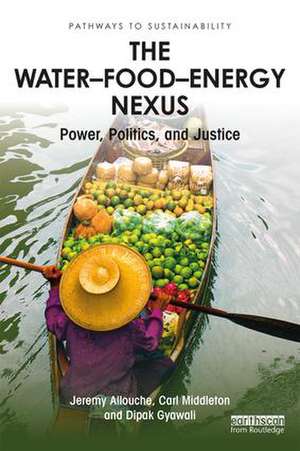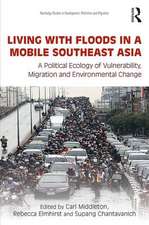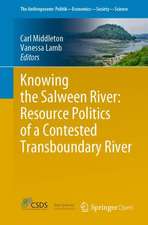The Water–Food–Energy Nexus: Power, Politics, and Justice: Pathways to Sustainability
Autor Jeremy Allouche, Carl Middleton, Dipak Gyawalien Limba Engleză Paperback – 17 apr 2019
The Water–Food–Energy Nexus: Power, Politics and Justice lays out the managerial-technical definitions of the nexus and challenges these conceptions by bringing to the forefront the politics of the nexus, around two key dimensions – a dynamic understanding of water–food–energy systems, and a normative positioning around nexus debates, in particular around social justice. The authors argue that a shift in nexus governance is required towards approaches where limits to control are acknowledged, and more reflexive/plural strategies adopted.
This book will be of interest to academic researchers, policy makers, and practitioners in the fields of international development studies, environmental politics, and science and technology studies, as well as international relations.
| Toate formatele și edițiile | Preț | Express |
|---|---|---|
| Paperback (1) | 311.92 lei 6-8 săpt. | |
| Taylor & Francis – 17 apr 2019 | 311.92 lei 6-8 săpt. | |
| Hardback (1) | 988.31 lei 6-8 săpt. | |
| Taylor & Francis – 25 apr 2019 | 988.31 lei 6-8 săpt. |
Din seria Pathways to Sustainability
-
 Preț: 257.70 lei
Preț: 257.70 lei -
 Preț: 258.62 lei
Preț: 258.62 lei -
 Preț: 258.66 lei
Preț: 258.66 lei -
 Preț: 169.50 lei
Preț: 169.50 lei -
 Preț: 273.26 lei
Preț: 273.26 lei -
 Preț: 320.89 lei
Preț: 320.89 lei -
 Preț: 481.86 lei
Preț: 481.86 lei -
 Preț: 318.66 lei
Preț: 318.66 lei -
 Preț: 271.32 lei
Preț: 271.32 lei -
 Preț: 238.37 lei
Preț: 238.37 lei -
 Preț: 272.16 lei
Preț: 272.16 lei -
 Preț: 331.29 lei
Preț: 331.29 lei - 26%
 Preț: 762.97 lei
Preț: 762.97 lei -
 Preț: 270.35 lei
Preț: 270.35 lei -
 Preț: 332.14 lei
Preț: 332.14 lei -
 Preț: 271.53 lei
Preț: 271.53 lei -
 Preț: 319.92 lei
Preț: 319.92 lei -
 Preț: 272.42 lei
Preț: 272.42 lei - 18%
 Preț: 210.55 lei
Preț: 210.55 lei -
 Preț: 240.72 lei
Preț: 240.72 lei -
 Preț: 468.30 lei
Preț: 468.30 lei -
 Preț: 315.16 lei
Preț: 315.16 lei -
 Preț: 320.89 lei
Preț: 320.89 lei -
 Preț: 361.31 lei
Preț: 361.31 lei -
 Preț: 273.22 lei
Preț: 273.22 lei
Preț: 311.92 lei
Nou
Puncte Express: 468
Preț estimativ în valută:
59.73€ • 60.96$ • 50.26£
59.73€ • 60.96$ • 50.26£
Carte tipărită la comandă
Livrare economică 26 februarie-12 martie
Preluare comenzi: 021 569.72.76
Specificații
ISBN-13: 9780415332835
ISBN-10: 0415332834
Pagini: 150
Ilustrații: 8
Dimensiuni: 156 x 234 x 12 mm
Greutate: 0.24 kg
Ediția:1
Editura: Taylor & Francis
Colecția Routledge
Seria Pathways to Sustainability
Locul publicării:Oxford, United Kingdom
ISBN-10: 0415332834
Pagini: 150
Ilustrații: 8
Dimensiuni: 156 x 234 x 12 mm
Greutate: 0.24 kg
Ediția:1
Editura: Taylor & Francis
Colecția Routledge
Seria Pathways to Sustainability
Locul publicării:Oxford, United Kingdom
Public țintă
PostgraduateCuprins
1. Introduction: Nexus and nexuses
2. A critique of the global hegemonic nexus narratives
3. Integration for whom? Learning from the past
4. The knowledge nexus and transdisciplinarity
5. Hybrid governance and grounding the nexus
6. Nexus rights and justice
7. Ethics and the nexus
8. Conclusion: ‘Democratising’ the nexus
2. A critique of the global hegemonic nexus narratives
3. Integration for whom? Learning from the past
4. The knowledge nexus and transdisciplinarity
5. Hybrid governance and grounding the nexus
6. Nexus rights and justice
7. Ethics and the nexus
8. Conclusion: ‘Democratising’ the nexus
Notă biografică
Jeremy Allouche is a Research Fellow at the Institute of Development Studies at the University of Sussex, UK, and a member of the ESRC-funded STEPS Centre.
Carl Middleton is Director of the Center of Excellence in Resource Politics for Social Development in the Center for Social Development Studies (CSDS) at the Faculty of Political Science, Chulalongkorn University, Thailand.
Dipak Gyawali is Pragya (Academician) of the Nepal Academy of Science and Technology and was Nepal’s Minister of Water Resources in 2002/2003. He conducts interdisciplinary research at the interface of technology and society, mostly from the perspectives of Cultural Theory.
Carl Middleton is Director of the Center of Excellence in Resource Politics for Social Development in the Center for Social Development Studies (CSDS) at the Faculty of Political Science, Chulalongkorn University, Thailand.
Dipak Gyawali is Pragya (Academician) of the Nepal Academy of Science and Technology and was Nepal’s Minister of Water Resources in 2002/2003. He conducts interdisciplinary research at the interface of technology and society, mostly from the perspectives of Cultural Theory.
Recenzii
"Beyond the commonplace recognition that the 'nexus' conceptual basis is not new and that integrative imperatives already featured in IWRM, this book further examines the underbelly of the beast and convincingly exposes the political underpinnings of a concept presented as a-political and 'manageable' through integrative tools, expert modeling, bureaucratic reforms and rational efficiency-driven thinking. It reveals the underlying business imperatives and green economy logics, traces the global diffusion of the concept, and emphasizes that issues of distributional justice, knowledge production and democratization of governance need to take center stage if the concept is to be transformative rather than supporting the status quo. An excellent reading for all water students and scholars interested in deciphering the word of water concepts and the interests and values that undergird them." — Francois Molle, Editor of Water Alternatives
"We frequently hear of the nexus - but what does this mean, what does it entail, and where to begin? To such questions, Allouche offers a critical guide. Careful to consider complexities and uncertainties, the theoretical discussion coupled with multi-sited case studies, offers a compelling treatment. Readers wanting to know more of the concept, including political economic and equity implications, will find reading the book to be time well spent." — Leila M Harris, University of British Columbia, Canada
"Skilfully delving into the nuances of the nexus approach, the authors trace and explain the emergence of the ‘new’ concepts of nexus – between water, food, energy, environment and more. Unravelling the tangle of nexus-invoking discourses, motivations and practices yields a valuable, sense-making analysis." — John Dore, Australia’s Department of Foreign Affairs and Trade
"The book does a great job at showing how a water-energy-food nexus approach emphasises demand-led technological and market solutions, downplays supply-side limits, promotes a technical and supposedly apolitical treatment of trade-offs, and largely ignores the political dimensions that shape control over, and access to, resources." — Molle, F. 2019. Review of "The water-food-energy nexus. Power, politics and Justice", Earthscan, 2018, by Allouche, J.; Middleton, C. and Gyawali, D., Water Alternatives, http://www.water-alternatives.org/index.php/boh/item/19-nexus
"We frequently hear of the nexus - but what does this mean, what does it entail, and where to begin? To such questions, Allouche offers a critical guide. Careful to consider complexities and uncertainties, the theoretical discussion coupled with multi-sited case studies, offers a compelling treatment. Readers wanting to know more of the concept, including political economic and equity implications, will find reading the book to be time well spent." — Leila M Harris, University of British Columbia, Canada
"Skilfully delving into the nuances of the nexus approach, the authors trace and explain the emergence of the ‘new’ concepts of nexus – between water, food, energy, environment and more. Unravelling the tangle of nexus-invoking discourses, motivations and practices yields a valuable, sense-making analysis." — John Dore, Australia’s Department of Foreign Affairs and Trade
"The book does a great job at showing how a water-energy-food nexus approach emphasises demand-led technological and market solutions, downplays supply-side limits, promotes a technical and supposedly apolitical treatment of trade-offs, and largely ignores the political dimensions that shape control over, and access to, resources." — Molle, F. 2019. Review of "The water-food-energy nexus. Power, politics and Justice", Earthscan, 2018, by Allouche, J.; Middleton, C. and Gyawali, D., Water Alternatives, http://www.water-alternatives.org/index.php/boh/item/19-nexus
Descriere
The Water-Food-Energy Nexus: Power, Politics and Justice lays out the managerial-technical definitions of the water, food and energy nexus and challenges these conceptions by bringing to the forefront the politics of the nexus.








